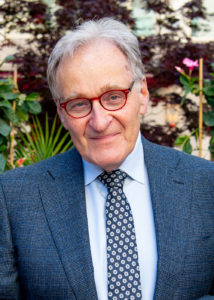
A two-year follow-up clinical trial found that a new personalized cellular therapy treatment for relapsed or refractory B-cell lymphoma demonstrated strong safety and improved overall survival in patients, according to findings published in Blood.
The findings expand on those from a previous clinical trial published in The Lancet, which found that lisocabtagene maraleucel (liso-cel), a type of chimeric antigen receptor (CAR) T-cell therapy, demonstrated strong safety for nearly all patients.
“The bottom line is that all the data from 2020 are holding up in 2024. We have about anywhere from a 40 to 50 percent sustained response and possible cure in a group of patients where the results might have been 5 to 10 percent,” said Leo I. Gordon, MD, the Abby and John Friend Professor of Oncology Research, professor of Medicine in the Division of Hematology and Oncology and a co-author of both clinical trials.
B-cells are specialized white blood cells called lymphocytes that generate antibodies to fight off pathogens and viruses. In B-cell lymphoma, patients produce too many mutated B-cells which spread to other parts of the body, including the lymph nodes, central nervous system, bone marrow and reproductive system.
The current standard of treatment is chemotherapy and bone marrow transplants, but treatments for patients with recurring disease have been limited. Less than half of patients with relapsed or refractory large B-cell lymphoma respond to treatment and the average survival for patients who relapse after their second or third line of treatment had been six to 12 months.
However, CAR T-cell therapy is changing the treatment landscape for refractory or relapsed B-cell lymphoma. CAR T-cell therapies are created from T-cells collected from patients, a procedure which T-cells removed from a patient’s blood are then altered by the insertion of new genes. These genes help the T-cells recognize and target a protein on the surface lymphoma cells. Once these immune cells are fully generated, they’re infused back into the patient.
In the initial clinical trial, more than 300 patients with relapsed or refractory large B-cell lymphoma were screened and 269 were given the CAR T-cell therapy. Overall, 73 percent of patients showed treatment response and the average survival was increased to 18 months.
In the current clinical trial, all of the 269 patients from this trial who had received an average of three previous lines of treatment, including chemotherapy and a bone marrow transplant, were examined two years after the initial trial start date.
At the two-year mark, patients demonstrated an average survival rate of 27.3 months and an estimated two-year survival rate of 50.5 percent.
Adverse events, specifically grade 3 to 4 cytokine release syndrome — when the body makes proteins that react to the therapy’s manipulated T-cells, resulting in fever and organ dysfunction — occurred in two percent of patients and neurological events occurred in 10 percent of patients, respectively.
The results are very promising, Gordon said, but added that more work needs to be done to ensure that all patients respond to the therapy with decreased toxicity.
“One of the questions is why it’s not at a hundred percent? Why doesn’t it work for everybody? We’re learning a lot about the genetic makeup of the tumor, the microenvironment of the tumor, the microenvironment and the health of the T-cells of the patient — a number of these factors play a role in determining the outcome,” said Gordon, who is also the director of the Lymphoma Program of the Robert H. Lurie Comprehensive Cancer Center of Northwestern University.
Gordon said his team is now determining whether liso-cel plus limited rounds of chemotherapy are more effective than chemotherapy alone in patients with first-line B-cell lymphoma.
“That’s going to answer the question is it better to give full dose chemotherapy in high-risk patients or can you stop chemotherapy early or maybe at some point never even start it and do CAR-T instead,” Gordon said.
The TRANSCEND NHL 001 (Lancet) study was funded by Juno Therapeutics, a Bristol Myers Squibb Company, and the long-term follow-up study (Blood) was funded by Celgene, a Bristol Myers Squibb Company.






